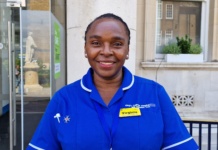An innovative national campaign – ‘It Starts With Me’ – has relaunched this week, and with real voices to tackle fear head on to show how people can test and protect themselves against HIV. “Nowadays, the HIV situation is different than it was 20 years ago, said Cary James, Head of Health Improvement Programmes at Terrence Higgins Trust.

“Thanks to medical advances it doesn’t have to stop you living a full and active life. And we now know that if you’re on effective treatment, you cannot pass it on to others. This is huge news. “That means our language around HIV must evolve and become more empowering and positive. We want to inspire people to test and protect themselves from HIV because it is the best thing they can do for their health and their community. We don’t want people to be afraid, we want them to be in control.” Ads across press, social media, high profile billboards and public transport will include the words ‘I’m not afraid of HIV’, featuring real people such as Yvette Twagiramariya sharing their personal reasons for supporting the campaign.
Yvette, a 28 year old sales executive from London, said: “I made the decision get involved in this campaign because I am from Rwanda where a lot of people are living with HIV, and I also know people here in the UK who are affected by it. “Unfortunately HIV is always linked to stigma, it has always been a taboo. If you talk about HIV around black people, they think you are sleeping around. However it shouldn’t have this stigma – I feel confident about testing and I go to sexual clinic regularly, every 3 months or so. “I work for the TV channel VoxAfrica and so when I heard about the campaign, I approached Terrence Higgins Trust to see if we could help promote it to our viewers, and I’ve been involved ever since. I love the posts of regular people all over the UK talking about testing. Sometimes, you see people you know – last year my colleague had her picture taken wearing the ‘It Starts With Me’ t-shirt. The real people and real voices are my favourite part of
the campaign, as it helps people realise we all have a role to play.” Mercy, a mother of two, appears in a campaign video, saying: “When I came to England in 2004, I was more focused on my career. At 33 I thought maybe this is the best time for me to have children. When I was diagnosed as HIV positive, I thought the possibilities of me having a child were actually not there for me. What if I have a baby and the baby is HIV positive? “I’m a living example to say that HIV should not hinder any woman from having children. The treatment is what is making it possible. Like any other mother now that your viral load is undetectable, the baby will be fine. I see it as a miracle, I feel honoured that I was given another chance. I’m in control of my HIV and I’m sharing my story to encourage others to get tested. It starts with me, Mercy.” The campaign is relaunching this month and aims to reach the most affected groups including people from black African communities. Black Africans make up 2% of the UK population, but last year accounted for 1 in 5 of all HIV diagnoses.
Meanwhile, men who have sex with men account for an estimated 43% of those living with HIV in the UK, and more than half (55%) of all new diagnoses. One in six people living with HIV do not know they have it – and are therefore likely to pass on the virus. On the other hand, those who get a positive result and get onto effective treatment cannot pass on HIV to others. That means HIV is more likely to be transmitted from someone whose last test was negative, than someone living with HIV who is on effective treatment. The challenge is now to bust the stigma that stops people getting tested, according to experts. Cary James added: “Everyone has the power to stop HIV, simply by getting tested, taking medication if they need it, and by protecting themselves. It starts with each one of us.”












